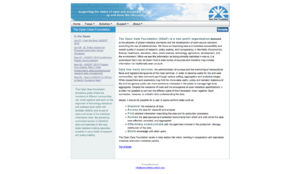Difference between revisions of "Open Data Foundation"
| (One intermediate revision by one other user not shown) | |||
| Line 7: | Line 7: | ||
== <small>'''Description'''</small> == | == <small>'''Description'''</small> == | ||
| − | Open Data Foundation | + | Open Data Foundation is a United States-based non-profit organization devoted to the adoption of global metadata standards and the development of open source solutions. One of its purposes is the improvement in the quality, access, administration and use of statistical data to support research, and to improve policies and transparency in the areas of economics, finance, health, work, social sciences, technology, agriculture, rural development and environment. |
| − | + | The project set out in 2006 to fill the void in the area of statistical data and metadata management in the social sciences, behavioral sciences and economics (SBE). The counselors, directors, managers, and team members are experts in the following fields: technology standards, national and international statistics, central banking, social sciences and data files, bank oversight and international development. | |
| − | + | The Open Data Foundation is run by Ernie Boyko, former president of the International Association for Social Science Information Services & Technology (IASSIST), Rune Gloersen, Head of Information Technology, Statistics Norway, and Robert Glushko, founder and leader of Berkeley's Center for Document Engineering. | |
| − | + | Open Data promotes the implementation of standards and specifications of data management, such as The Data Documentation Initiative, Statistical Data and Metadata Exchange (SDMX) Standard, Dublin Core (DC), ISO/IEC 11179, ISO 19115, and others, that are possible thanks to the efforts of various standard agencies and consortia. This standards aim to ensure that the information has the following characteristics: suitable for use and purpose, consistent, coherent and extensive, permanent, relevant and capable to respond to real questions, accessible (can be easily discovered and understood), safe and well documented. | |
| − | + | The Foundation works to allow the discovery of information, access to research and analysis, production processes and access to sources. It also promotes effective communication with agencies involved in its production, archiving and distribution. Finally, the Foundation supports and coordinates technical assistance for the adoption of specifications, best practices, and capacity building, developing training and reference materials. | |
== <small>'''Links'''</small> == | == <small>'''Links'''</small> == | ||
| Line 32: | Line 32: | ||
[[Category:Open data]] | [[Category:Open data]] | ||
[[Category:Nonprofit]] | [[Category:Nonprofit]] | ||
| − | [[Category: | + | [[Category:501(c)3 nonprofit]] |
Latest revision as of 22:37, 10 June 2017
Self-portrait
The Open Data Foundation (ODaF) is a non-profit organization dedicated to the adoption of global metadata standards and the development of open-source solutions promoting the use of statistical data. We focus on improving data and metadata accessibility and overall quality in support of research, policy making, and transparency, in the fields of economics, finance, healthcare, education, labor, social science, technology, agriculture, development, and the environment. While we see this information as being primarily statistical in nature, it is understood that it can be drawn from a wide variety of sources and therefore may include information not traditionally seen as such. (http://www.opendatafoundation.org/)
Description
Open Data Foundation is a United States-based non-profit organization devoted to the adoption of global metadata standards and the development of open source solutions. One of its purposes is the improvement in the quality, access, administration and use of statistical data to support research, and to improve policies and transparency in the areas of economics, finance, health, work, social sciences, technology, agriculture, rural development and environment.
The project set out in 2006 to fill the void in the area of statistical data and metadata management in the social sciences, behavioral sciences and economics (SBE). The counselors, directors, managers, and team members are experts in the following fields: technology standards, national and international statistics, central banking, social sciences and data files, bank oversight and international development.
The Open Data Foundation is run by Ernie Boyko, former president of the International Association for Social Science Information Services & Technology (IASSIST), Rune Gloersen, Head of Information Technology, Statistics Norway, and Robert Glushko, founder and leader of Berkeley's Center for Document Engineering.
Open Data promotes the implementation of standards and specifications of data management, such as The Data Documentation Initiative, Statistical Data and Metadata Exchange (SDMX) Standard, Dublin Core (DC), ISO/IEC 11179, ISO 19115, and others, that are possible thanks to the efforts of various standard agencies and consortia. This standards aim to ensure that the information has the following characteristics: suitable for use and purpose, consistent, coherent and extensive, permanent, relevant and capable to respond to real questions, accessible (can be easily discovered and understood), safe and well documented.
The Foundation works to allow the discovery of information, access to research and analysis, production processes and access to sources. It also promotes effective communication with agencies involved in its production, archiving and distribution. Finally, the Foundation supports and coordinates technical assistance for the adoption of specifications, best practices, and capacity building, developing training and reference materials.
Links
URL: http://www.opendatafoundation.org/
Wayback Machine: https://web.archive.org/web/*/http://www.opendatafoundation.org/
